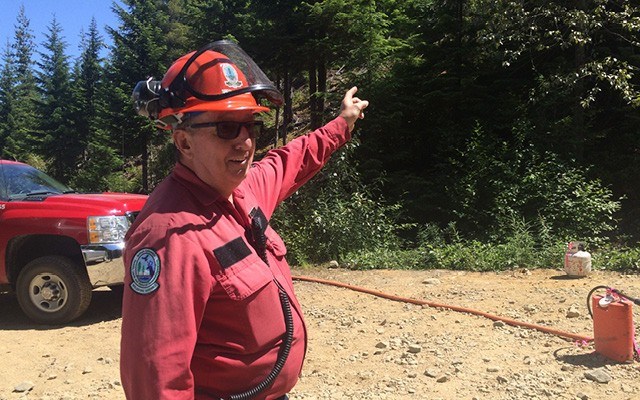Memories of last summer's devastating Fort McMurray wildfire undoubtedly ran through the minds of Whistler officials this weekend as smoke billowed from the base of Blackcomb Mountain.
But thanks to the coordinated response from multiple agencies on Sunday, July 2, the one-hectare blaze did not spread beyond Blackcomb Benchlands to the billions of dollars worth of infrastructure nearby.
"In working with our partners at Whistler Blackcomb and the Whistler Fire Department, that was the key to our success. All three agencies came together in a very short time," said officer Rob Dombowsky with the BC Wildfire Service, who noted it took about 30 minutes from the time the local fire department requested additional resources from the provincial agency to when contracted Blackcomb Aviation helicopters were dumping water on the fire. Air tankers also supported the efforts by dropping crimson streaks of fire retardant on the smouldering fire.
Crews had access to the water reservoir Whistler Blackcomb typically uses for snowmaking, which Dombowsky said was crucial in containing the blaze. The fire was under control by 9 p.m. local time, roughly four hours after initial reports came in.
Officials said the fire was human-caused. A squatter shack was found at the site of the fire, with what appeared to be remnants of burned paper at the scene. Whistler RCMP Sgt. Rob Knapton confirmed a man was questioned in connection with the fire, which was determined to be accidental. The investigation is ongoing.
"Clearly we don't support a campfire that is illegal, and this is an example of what can go wrong when you have a fire in the woods," said Whistler Fire Chief Geoff Playfair. Whistler's fire danger rating has been at high, meaning all fires are banned within municipal boundaries, since June 24. A campfire ban has also been put in place for the Coastal Fire Centre — which includes Whistler — until further notice.
As the weather heats up and the housing market grows tighter, more campers are springing up on the outskirts of Whistler, drawing concern from officials at the height of wildfire season.
On June 25, a small fire broke out near Wedge that is believed to have been sparked by an illegal campfire.
A long-time local squatter was recently removed from Crown land south of Whistler two years after the municipality filed a formal complaint with the Ministry of Forests, citing concerns with wildfire and other hazards.
Mayor Nancy Wilhelm-Morden said Sunday's fire reinforced the need to address squatters. Illegal campers are dealt with on a complaint-driven basis.
"We're very, very concerned about who's out in the forest and what they're doing," she added.
A corridor-wide evacuation plan is being drafted that the mayor said was "particularly important" given the disaster in Fort McMurray last year and the fact that Whistler has only one road out of the community.
"That's underway and it will consider things like anywhere where there's three lanes of traffic, they would all be dedicated to southbound traffic," she explained. The plan is expected within a few months.
Of course, the municipality has its own wide-ranging emergency plan in place that would see residents gather at various muster points around the community before being evacuated via school bus and other vehicles during a state of local emergency.
In January, forester and biologist Bruce Blackwell presented a report to council that laid out two budgets for fuel thinning that would help protect Whistler from wildfire. The preferred option, which would come at a cost of $16 million over 10 years, is based on completing 30 ha. of fuel thinning per year, along with 40 ha. of fuel breaks.
Whistler has several outside funding sources to draw from to help pay for this work — like the Union of BC Municipalities Strategic Wildfire Prevention Initiative and the Provincial Forest Enhancement Society — but those funds are far from a certainty.
"We can always do with more provincial funding both for FireSmarting and for potential firefighting," said Wilhelm-Morden.
The municipality has been pushing Whistlerities to have their properties assessed through B.C.'s FireSmart program. So far this year, the fire department has assessed 35 residential homes, with another 21 pending, according to Playfair.*
*An earlier version of this story noted that only three residential homes have been inspected through the FireSmart program in 2017, the figure provided by the municipality. In fact, the RMOW's FireSmart coordinator has carried out three inspections, while the fire department has completed another 35. Pique regrets the mix-up.




